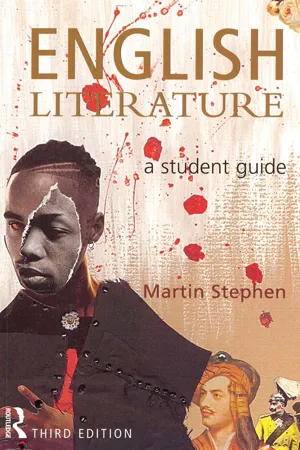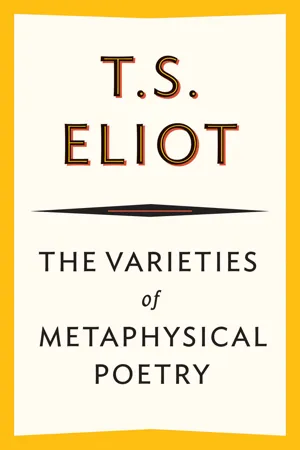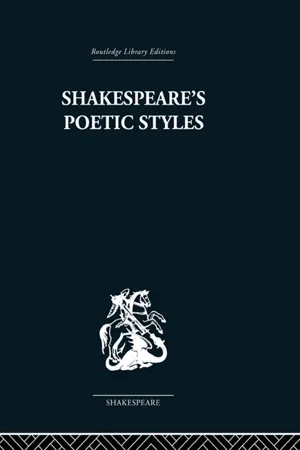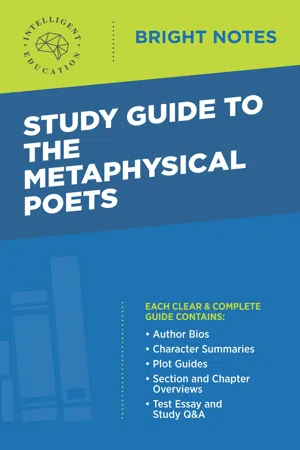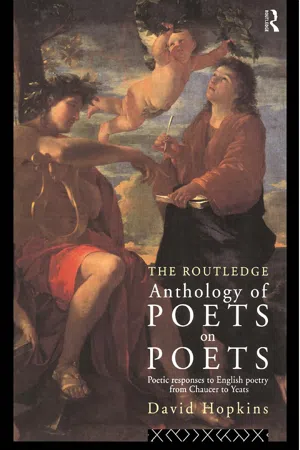Metaphysical Poets
The Metaphysical Poets were a group of 17th-century English poets known for their intellectual and philosophical approach to poetry. They often explored complex and abstract ideas, using elaborate metaphors and conceits to convey their thoughts. Key figures of this movement include John Donne, George Herbert, and Andrew Marvell, who are celebrated for their innovative and unconventional poetic style.
5 Key excerpts on "Metaphysical Poets"
- eBook - ePub
English Literature
A Student Guide
- Martin Stephen(Author)
- 2013(Publication Date)
- Routledge(Publisher)
...CHAPTER TEN The Metaphysical Poets John Donne was born in 1571, or thereabouts; Henry Vaughan, another Metaphysical poet, died in 1695, and it is hardly surprising that poets whose lives stretched out over a hundred years should be so individual. It is perhaps more surprising that there are sufficient similarities between all the poets generally held to be in the Metaphysical school to justify their all being branded with the same name. General issues and questions The four Metaphysical Poets who appear with the greatest frequency on examination syllabuses are John Donne (1571–1631), Andrew Marvell (162178), George Herbert (1593–1633) and Henry Vaughan (1622–95). All these authors are highly individual, but certain general areas in their work can be distinguished. It is very common to find a definition of Metaphysical poetry, in quotation form, as an essay title, with the candidate required to sift through this definition with reference to the author he or she is studying. Read the definition given in Chapter 3 of this work, and any other definitions you can find. Make sure you understand also the entries on conceit and paradox, two techniques central to Metaphysical poetry. Originally the term ‘metaphysical’ was coined by John Dryden (1631–1700) and later popularised by Dr Samuel Johnson (1709–84), and the features of the school which unite the various authors are quite numerous. As well as making widespread use of conceit, paradox, and punning or wordplay, the Metaphysicals drew their imagery from all sources of knowledge, and in particular from science, theology, geography, and philosophy. The images are often startling in themselves, very tightly packed, and in startling contrast to each other, something which has led to the accusation that their imagery is too shocking, and their poems mere displays of wit...
- eBook - ePub
- T. S. Eliot(Author)
- 2014(Publication Date)
- Mariner Books(Publisher)
...Under philosophical poetry we must, a priori, include Lucretius and Dante, poets whom we take to be poets and to be philosophical by immediate inspection and common consent. And we must not include all great poetry, for the adjective would become meaningless. And we must proceed from the side of poetry, not from that of philosophy. That is to say, we must restrict the inclusion to poetical work of the first intensity, in which the thought is so to speak fused into poetry at a very high temperature. Consequently we must leave out of account those works, even when very fine, such as Pope’s Essay on Man, in which the fusion is less perfect, or made at a lower temperature, and some works of Blake in which we are not sure that it takes place at all. 7 Now I am convinced that of “philosophy” in this legitimate sense, in the sense in which we can speak of Lucretius, Dante and Goethe as philosophical (though not so surely as “philosophers”), Donne and the poets whom we associate with him possessed not an atom. So far, we find no justification for using the term “metaphysical”. Some years ago I had a correspondence with Mr. Saintsbury, both in The Times and privately, on this very point. 8 Mr. Saintsbury wished not only to keep the term—and in this we are in accord—but to give it, by what hardly seemed to me better than a jeu de mots, a further and more exact significance based on its etymology. Metaphysics was, of course, originally only that work of Aristotle’s which came after his Physics. But the metaphysical, for Mr. Saintsbury, is that which comes after the natural; the Metaphysical Poets are those who seek something beyond or after nature, refinements of thought or emotion: ergo, they are metaphysical. Mr. Saintsbury’s definition of Metaphysical Poets as those who have and are chiefly interested in “second thoughts”, as he phrases it, is ingenious and worth considering...
- eBook - ePub
Shakespeare's Poetic Styles
Verse into Drama
- John Baxter(Author)
- 2013(Publication Date)
- Routledge(Publisher)
...Metaphysical poetry is thought to be any poetry that elaborates, adheres to, or even merely alludes to, a metaphysical system; or it is thought to be poetry that characteristically exhibits metaphorical ingenuity or even incongruity. In 1933, in ‘On Metaphysical Poetry’, James Smith made an admirable attempt to reconcile these two critical traditions, reclaiming for metaphysical poetry a meaning not wholly disreputable from the point of view of philosophy, while directing attention to certain aspects of poetic style. Discounting allusions to metaphysical systems, he claims that metaphysical poetry, properly so called, has, as a result of viewing the world in a certain way, something of the same air of puzzlement that characterizes the work of metaphysicians; and further, that this puzzlement is often embodied in a ‘metaphysical conceit.’ 3 Metaphysics is ‘puzzling’, if I may retain the homely word, in a peculiar way. It is not that, to the matters it studies, there is an abundance of clues, so that the mind is lost among them; or that there is a shortage of clues, so that the mind is left hesitant; but rather that such clues as there are, while equally trustworthy, are contradictory. And again, I do not mean that they are contradictory as are, say, pleas in a law-court. A judge is puzzled if he has before him two chains of evidence, one tending to prove that a certain person was in a certain spot at a certain time, the other that he was not. In cases like this, the contradiction rests upon accidents merely: it is compatible with the nature of the person whose movements are being considered, either that he was, or that he was not, at the given spot. The contradictions in metaphysics, on the other hand, spring from essence. The very nature of things brings them forth...
- eBook - ePub
- Intelligent Education(Author)
- 2020(Publication Date)
- Influence Publishers(Publisher)
...THE Metaphysical Poets CRITICAL COMMENTARY EIGHTEENTH AND NINETEENTH CENTURIES Formal criticism of the Metaphysical Poets may be said to begin with Samuel Johnson, and his famous condemnation contained in the Life of Cowley (1779): Wit, like all other things subject by their nature to the choice of man, has its changes and fashions, and a different times takes different forms. About the beginning of the seventeenth century, appeared a race of writers that may be termed the Metaphysical Poets; of whom, in a criticism on the works of Cowley, it is not improper to give some account. The Metaphysical Poets were men of learning, and to show their learning was their whole endeavour: but, unluckily resolving to show it in rhyme, instead of writing poetry they only wrote verses, and very often such verse as stood the trial of the finger better than of the ear. . .. . . Their thoughts are often new, but seldom natural; they are not obvious, but neither are they just; and the reader, far from wondering that he missed them, wonders more frequently by what perverseness of industry they were ever found.. . . The most heterogeneous ideas are yoked by violence together; nature and art are ransacked for illustrations, comparisons, and allusions; their learning instructs, and their subtilty surprises; but the reader commonly thinks his improvement dearly bought, and though he sometimes admires, is seldom pleased. Johnson’s blast is a magnificent and entertaining piece of rhetoric, but precisely what we would expect the neo-Classical attitude to be. With rare exceptions, the opinion of the Romantics was equally unfavorable...
- eBook - ePub
The Routledge Anthology of Poets on Poets
Poetic Responses to English Poetry from Chaucer to Yeats
- David Hopkins(Author)
- 2003(Publication Date)
- Routledge(Publisher)
...In the infancy of the world, neither poets themselves nor their auditors are fully aware of the excellence of poetry, for it acts in a divine and unapprehended manner, beyond and above consciousness; and it is reserved for future generations to contemplate and measure the mighty cause and effect in all the strength and splendour of their union. Even in modern times, no living poet ever arrived at the fullness of his fame; the jury which sits in judgement upon a poet, belonging as he does to all time, must be composed of his peers; it must be impanelled by time from the selectest of the wise of many generations. A poet is a nightingale, who sits in darkness and sings to cheer its own solitude with sweet sounds; his auditors are as men entranced by the melody of an unseen musician, who feel that they are moved and softened, yet know not whence or why. ((wr. 1821; pub. 1840) Percy Bysshe Shelley (1792–1822), from A Defence of Poetry) 60 Poetry and morality Ethical science arranges the elements which poetry has created, and propounds schemes and proposes examples of civil and domestic life; nor is it for want of admirable doctrines that men hate, and despise, and censure, and deceive, and subjugate one another. But poetry acts in another and diviner manner. It awakens and enlarges the mind itself by rendering it the receptacle of a thousand unapprehended combinations of thought...
